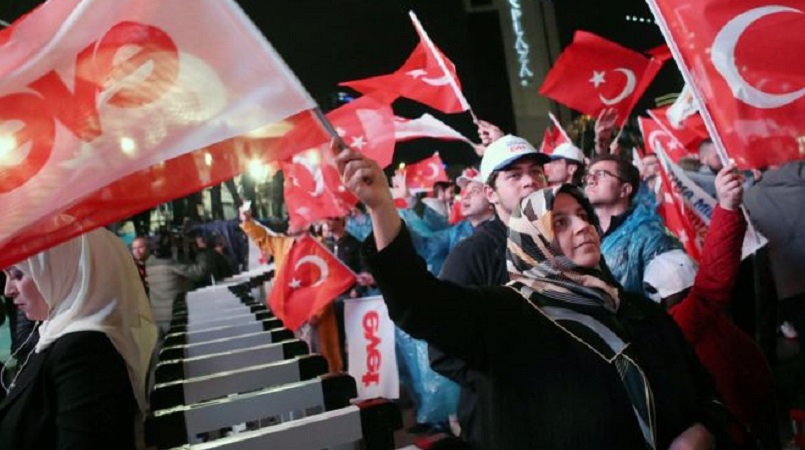
The Turkish prime minister has claimed victory in the referendum to grant President Recep Tayyip Erdogan new powers, based on unofficial results.
Binali Yildirim was speaking as the count neared completion. With about 99% of ballots counted, "Yes" was on about 51.3% and "No" on about 48.7%.
Erdogan supporters say replacing the parliamentary system with an executive presidency would modernise the country.
The two main opposition parties are challenging the results.
A "Yes" vote could also see Mr Erdogan remain in office until 2029.
Three people were shot dead near a polling station in the south-eastern province of Diyarbakir, reportedly during a dispute over how they were voting.
This could get ugly: Mark Lowen, BBC News, Ankara
Supporters are streaming into the governing AK party's headquarters here in Ankara, car horns and campaign songs blaring - they are convinced the "Yes" side has won and that President Erdogan now has a mandate for the biggest political reform in Turkey's modern history.
The president has claimed victory but the opposition disputes it, complaining of massive irregularities with the voting, suggesting the state news agency manipulated results and vowing to challenge them with the supreme election board.
Turkey has shown itself more polarised than ever tonight. And if the protests gather steam, this could get ugly.
How did the ruling party portray the result?
"The presidential system, according to unofficial results, has been confirmed with a 'Yes' vote," Prime Minister Yildirim told a cheering crowd from the balcony at AKP headquarters in Ankara.
"This is a decision made by the people. In our democracy's history, a new page has opened."
President Erdogan reportedly called Mr Yildirim earlier to congratulate him.
Elsewhere, Deputy Prime Minister Veysi Kaynak admitted the "Yes" vote had been lower than expected.
How significant are the changes?
They would represent the most sweeping programme of constitutional changes since Turkey became a republic almost a century ago.
The president would be given vastly enhanced powers to appoint cabinet ministers, issue decrees, choose senior judges and dissolve parliament.
The new system would scrap the role of prime minister and concentrate power in the hands of the president, placing all state bureaucracy under his control.
What is the case for 'Yes'?
Mr Erdogan says the changes are needed to address Turkey's security challenges nine months after an attempted coup, and to avoid the fragile coalition governments of the past.
"This public vote is [about] a new governing system in Turkey, a choice about change and transition," he said after casting his vote in Istanbul.
The new system, he argues, will resemble those in France and the US and will bring calm in a time of turmoil marked by a Kurdish insurgency, Islamist militancy and conflict in neighbouring Syria, which has led to a huge refugee influx.
The referendum, the BBC's Mark Lowen reports, is effectively one on Mr Erdogan and the Turkey he has moulded in his image: fiercely nationalist and conservative.
And what about for 'No'?
The Republican People's Party (CHP) has demanded a recount of 60% of the votes.
Critics of the proposed changes fear the move would make the president's position too powerful, arguing that it would amount to one-man rule, without the checks and balances of other presidential systems.
They say his ability to retain ties to a political party - Mr Erdogan could resume leadership of the AK Party - would end any chance of impartiality.
Kemal Kilicdaroglu, leader of the CHP, told a rally in Ankara a "Yes" vote would endanger the country.
"We will put 80 million people... on a bus with no brakes," he said.
"No" supporters have complained of intimidation during the referendum campaign and that Turkey's highly regulated media has given them little coverage.
What's the wider context?
Many Turks already fear growing authoritarianism in their country, where tens of thousands of people have been arrested, and at least 100,000 sacked or suspended from their jobs, since a coup attempt last July.
The campaign unfolded under a state of emergency imposed in the wake of the failed putsch.
Mr Erdogan assumed the presidency, meant to be a largely ceremonial position, in 2014 after more than a decade as prime minister.
This once stable corner of the region has in recent years been convulsed by terror attacks and millions of refugees, mostly from Syria, have arrived.
At the same time, the middle class has ballooned and infrastructure has been modernised. Under Mr Erdogan, religious Turks have been empowered.
Relations with the EU, meanwhile, have deteriorated. Mr Erdogan sparred bitterly with European governments who banned rallies by his ministers in their countries during the referendum campaign. He called the bans "Nazi acts".
In one of his final rallies, he said a strong "Yes" vote would "be a lesson to the West".
What's in the new constitution?
The draft states that the next presidential and parliamentary elections will be held on 3 November 2019.
The president would have a five-year tenure, for a maximum of two terms.
- The president would be able to directly appoint top public officials, including ministers
- He would also be able to assign one or several vice-presidents
- The job of prime minister, currently held by Binali Yildirim, would be scrapped
- The president would have power to intervene in the judiciary, which Mr Erdogan has accused of being influenced by Fethullah Gulen, the Pennsylvania-based preacher he blames for the failed coup in July
- The president would decide whether or not impose a state of emergency
